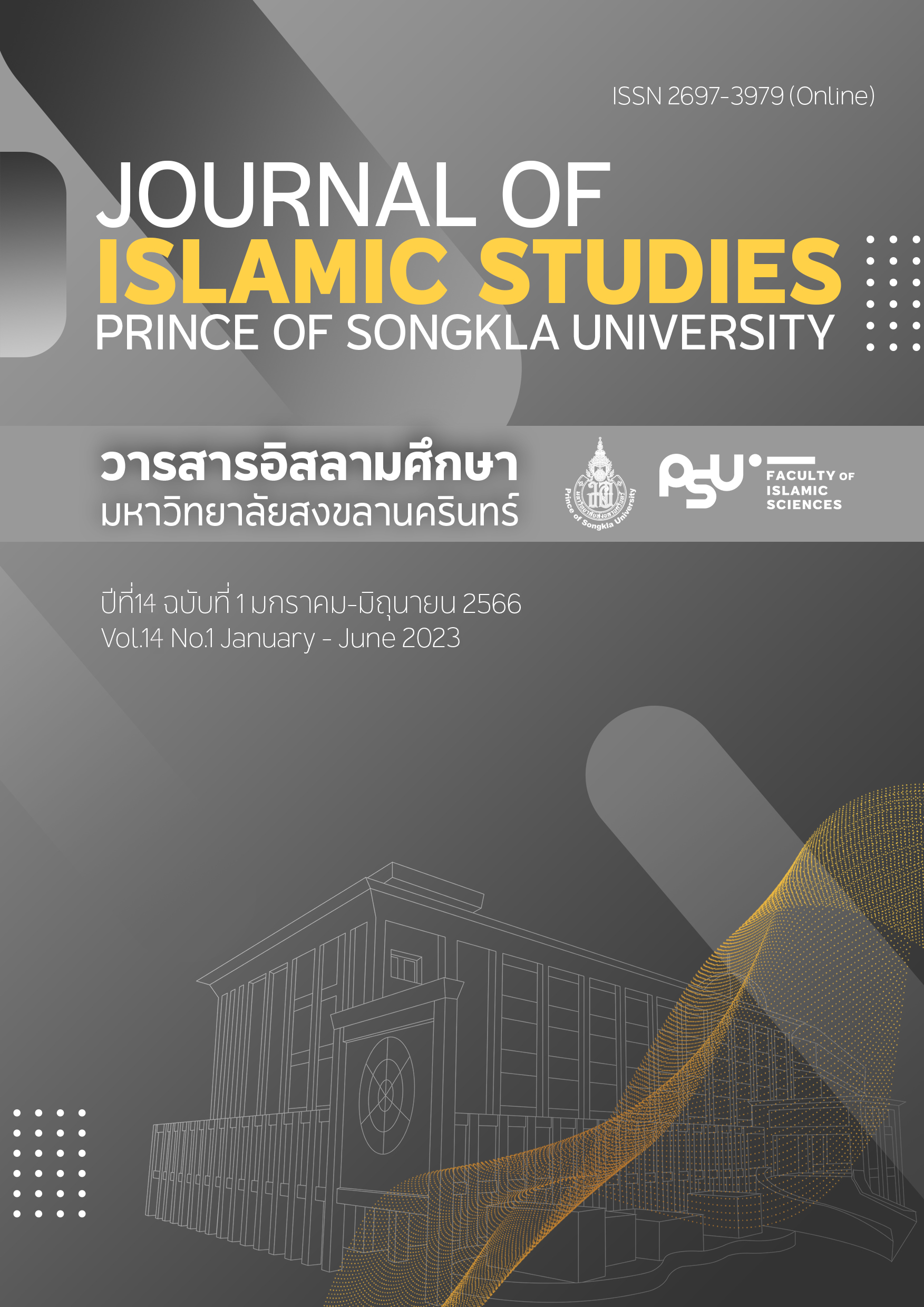Study of Islamic Ways of Voluntarily Serving the Muslim Community by the Private Schools’ Administrators in Songkhla Province.
Keywords:
Muslim community, Islamic way of voluntary serving, Islamic private schoolsAbstract
Objectives: 1) to study the meaning and structure of Thai Muslim Community, 2) to study the voluntary serving of community in general as well as Islamic views, and 3) to study ways of voluntarily serving the Muslim community by the Islamic Private Schools’ Administrators in Songkhla Province.
Methodology: The study is a mixed method quantitatively using questionnaire and qualitatively interview as research tools for collecting data. The sample of key informants is the administrators (licensees, directors, managers) of 48 Islamic private schools in Songkhla Province. The data analysis was divided into 2 parts: 1) the quantitative data were analyzed for frequency and percentage, arithmetic Mean, standard deviation, and 2) the qualitative data used the method of inductive analysis to draw conclusions and present research results in a descriptive manner.
Research Findings: 1) The Muslim Thai Community is a group of people gathered in Thailand having mutually social interactions and communication through unique lifestyles, cultures, customs and practices, and abiding by the Holy Quran and the Sunnah as a guideline for practice. Their community has 5 social structures, namely 1) principle of faith or belief, 2) social leadership, 3) social institutions, 4) social occasions, and 5) culture and values, 2) The voluntarily serving of community both in general and Islamic views are similar covering helping others individually or collectively in form of property, labor, intellect and time to gain profits, solve problems or to develop for goodness’s sake. The Islamic voluntary way differs from the non-Islamic one in that all dimensions of Islamic practices are based on the principles of belief and divine commandments. The study of Islamic teachings in the Holy Quran, the Sunnah and views of Muslim scholars and sags found that the Islamic ways of voluntarily serving community are 16 which include 1) being Imam in prayer, 2) calling for prayer, 3) serving Mosque, 4) teaching the holy Quran and other sciences, 5) career development, 6) alms giving, 7) expenditure for family, 8) mediation to solve conflicts, 9) advocating good deeds and forbidding evils, 10) helping the needy and the poor, 11) helping the distressed, 12) Riding ways off hindrances, 13) supporting the treatment of the deaf, 14) Explaining people with intellectual disabilities, 15) helping the blind to cross paths, and 16) doing good to both live-stocks and wild animals, 3) the analysis of behavior, motivator, and Islamic ways of voluntarily serving the Muslim community by the Private Schools’ administrators in Songkhla Province found that the voluntary behavior and motivation of the Private Schools’ administrators in Songkhla Province is at much level while as a whole the voluntarily serving of the Muslim community by the Private Schools’ administrators in Songkhla Province is at moderate level, 4) the Islamic ways of voluntarily serving the Muslim community by the Private Schools’ administrators in Songkhla Province are found that they are of 3 ways, namely 1) the Islamic way of voluntarily serving the Muslim community in form of action or practice, 2) the Islamic way of voluntarily serving the Muslim community in form of management, and 3) the Islamic way of voluntarily serving the Muslim community in form of education.
Contribution: The results of the research can be applied as an Islamic guideline for voluntarily serving the Muslim community that is consistent with the current context and driving social development to meet the goals and achieve maximum benefits.
References
Arab Alumni Association. (2004). The Holy Quran with Thai meaning. King Fahd Center for the Quran Printing in Madinah.
Ahmad, M. (2001). Musnad Imam Ahmad. Mu-assasah al-Risalah.
Boonchom, S. (2545). Introduction to Research (7th edition). Suweeriyasan.
al-Bukhari, M. (2001). Sohih al-Bukhari (صحيح البخاري). Dar Tuk al-Najah.
al-Bukhariy, M. (1422). Sahih al-Bukhariy (صحيح البخاري). Dar Tauqu al-Najat.
al-Hashimiy, M. (2013). Al-Mujtama’ al-Muslim Kama Yabnihi al-’Islam fi al-Kitab wa al-Sunnah (المجتمع المسلم كما يبنيه الإسلام في االكتاب والسنة). Al-Qahirah Dar al-Salam li at-Taba‘ah wa al-Nashri wa al-Tauzia’.
Boonyanusith, K. (2011). Development of instructional model for enhancing respectful mind and ethical mind based on teaching and learning via service learning for undergraduate students. Dissertation, Ed.D. (Curriculum Research and Development). Graduate School, Srinakharinwirot University.
’Ibn Baththal, Y. (2003). Syarh Sahih al-Bukhariy (شرح صحيح البخارى). Maktabah al-Rusyd.
’Ibn Hajjaj, M. (1955). Sahih Muslim (صحيح المسلم). Dar Ihya’ al-Turath al-‘Arabi.
’Ibn Kathir, I. (1999-1420). Tafsir ’Ibn Kathir (تفسير ابن كثير). Dar al-Taiyyibah.
Puangngam, K. (2550). Local government on theories, concepts and principles (Textbook).
Suthirath, C. (2555). Teaching children to have a public mind. V. Print Company Limited.
Wongsangiam, M. (2008). Arab-Thai dictionary. Manop Wongsangiam Book Center.
Downloads
Published
How to Cite
Issue
Section
License
Copyright (c) 2023 © The Author(s). Published by the Journal of Islamic Studies, Prince of Songkla University under the Creative Commons Attribution 4.0 International License.

This work is licensed under a Creative Commons Attribution 4.0 International License.
All articles Published in The Journal of Islamic Studies are author’s opinions, and not the responsibility of the Faculty of Islamic Sciences nor the editorial board. However any citation should be referred to the journal.
















